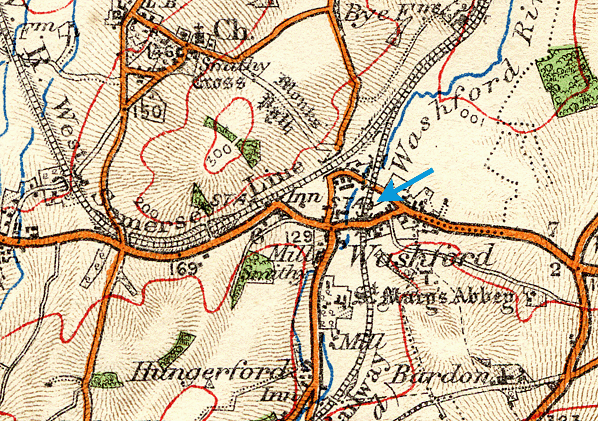|
Notes: The West Somerset Mineral Railway was a private venture
by The Brendon Hills Iron Ore Company to extract Iron Ore 1000
feet above sea level in the Brendon Hills. The ore was transported
to Watchet Harbour (West Jetty) for onward transmission to the
Ebbw Vale Co. in South Wales. It included a 3/4 mile long 1 in
4 incline at Comberow. Although the line built primarily as a
freight line and for the use of miners it occasionally carried
some other passengers from September 1857. To serve the isolated
communities (along the Brendon Hills at the various mines), a
public passenger service between Watchet and Comberow was introduced
on 4th September 1865 and it was possible to travel up the incline
and on to Gupworthy in a truck, free, but at one's own risk. The
mines finally closed in September 1883 due to competition from
cheap imports and the passenger service was reduced to two mixed
trains daily. All traffic ceased on 8th November 1898 when the
rolling stock was moved to Ebbw Vale by means of a temporary connection
to the GWR Minehead Branch at Kenrsford.
Part of the route between Watchet and Comberow was re-opened
in 1907 by The Somerset Mineral Syndicate using cheap second hand
wagons and an ex-Metropolitam Railway tank engine. They also re-opened
the incline but did not extend the reopening to Gupworthy but
built a steam worked 2 ft gauge narrow-gauge line along the roadside
to Raleigh's Cross Inn and then down an incline to Colton Mine.
Although there was a public excursion on July 4th 1907 complete
with Watchet Council and the town band, they travelled in open
wagons. No passenger service was introduced. This venture collapsed
in March 1910.
Australian Inventor A.R.Angus took over the Watchet to Washford
section to demonstrate his patented automatic train control in
December 1911 using two GWR locomotives.
The track was commandeered by The Ministry of Munitions in 1917
being lifted by 1919.
An Act of Parliament Abandoned the line with an auction of the
land and property in 1924 with the company being wound up in 1925
The mines finally closed in September 1883 due to competition
from cheap imports and the passenger service was reduced to 2
mixed trains daily. All traffic ceased on 8th November 1898
Further reading:
The West Somerset Mineral Railway by Roger Sellick - published
by David & Charles 1962.
Railways Around Exmoor by Robin Madge - Exmoor Press 1971 ISBN
0 900131 18 7
The Old Mineral Line by R.J.Sellick - Exmoor Press 1976 ISBN 0
900131 39 X
The Watchet Museum (by the harbour) also has a large collection
of photographs of the line.
To see the other
stations on the West Somerset Mineral Railway click on the station
name: Watchet, Roadwater,
Comberow, Brendon
Hill, Luxborough
Road & Gupworthy
|


 Home Page
Home Page 

 Home Page
Home Page